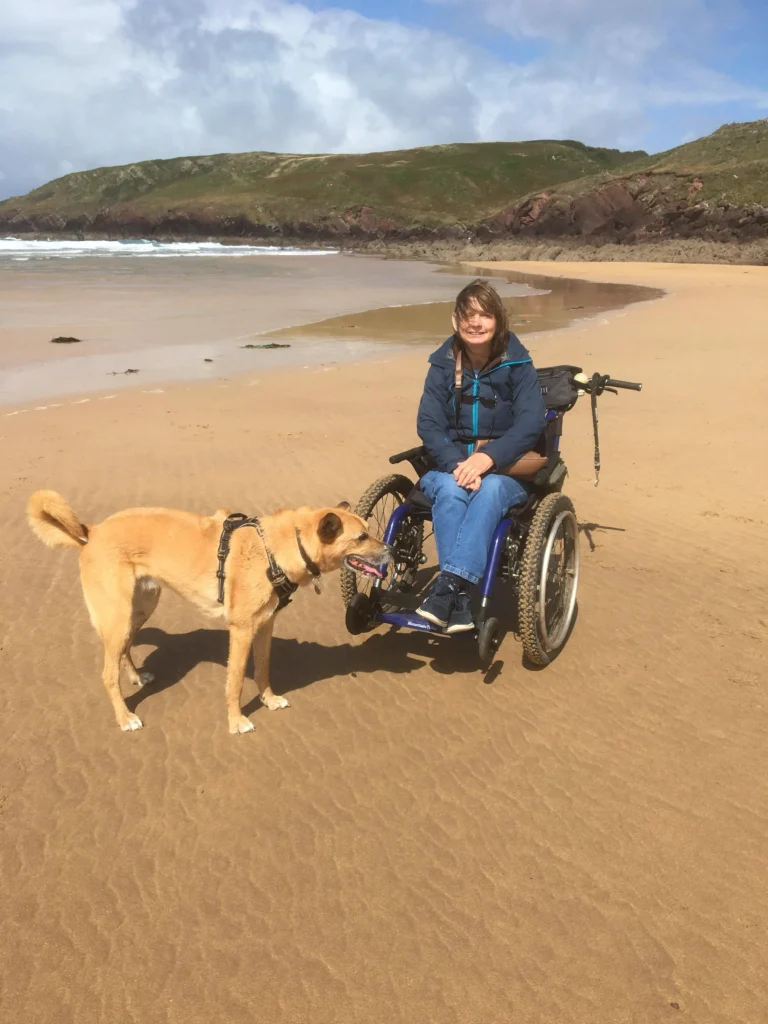Before her diagnosis of Multiple Sclerosis at the age of 31, Lucy’s life was a whirlwind of activity and vitality. From her bustling career in financial recruitment in London to embracing family life in Hampshire as a dedicated secretary and mother of two, Lucy thrived on the vibrancy of her daily routines. Weekends were filled with gardening, leisurely walks, and the camaraderie of supporting her husband’s cricket matches.
However, as her 40s approached, Lucy noticed a gradual decline in her mobility. Initially relying on a walking stick, it wasn’t until her late 40s that the impact of her condition became more pronounced. Transitioning from relapsing/remitting MS to Secondary Progressive MS brought with it challenges, particularly affecting her balance and weakening the right side of her body. Despite these hurdles, Lucy persisted, embracing tools like a rollator and wheelchair to navigate her daily life.
The long-term neurological condition imposed significant adjustments to Lucy’s day-to-day activities. Balancing the risk of falls became a primary concern, yet through careful management, she gradually minimised the frequency of such incidents. In 2016, Lucy embarked on her rehabilitation journey with Hobbs Rehabilitation South East, initially attending weekly exercise groups and later receiving physiotherapy from Laura Harman, Specialist Neurological Physiotherapist, and regular massage therapy from a Clinical Massage Therapist who worked alongside the therapy team.
At Hobbs, Lucy found more than just physical therapy; she discovered a beacon of hope and support through continuing with the fun and engaging exercise groups and physiotherapy focused on maintaining her core strength, balance, and limb mobility. Regular therapy teaches Lucy invaluable skills and strategies to manage her MS symptoms effectively. Whether it be learning adaptive techniques to navigate everyday challenges or developing a deeper understanding of her body’s needs, Lucy emerges from each session feeling empowered and equipped to face the complexities of her condition with confidence.
The impact of Hobbs Rehabilitation on Lucy’s day-to-day life has been profound; Lucy, now 60, continues to lead a fulfilling and active lifestyle. Gardening, walking with her husband and dogs, and relishing in the simple joys of everyday life are all made possible through her own determination and the assistance and encouragement provided by Hobbs. she has even been a key player in Hobbs community events such as Step Out for Stroke back in 2018 where she walked around Southsea lake with Team Hobbs and the more recent Get Active campaign which saw the South East team combine their efforts to travel the distance from Land’s End to John o’Groats by whichever means possible in clinic and at home! Fun and laughter are great influencers in achieving success with rehab goals and Lucy always embraces the Hobbs initiatives with gusto.
Lucy tells us that under the expert care of the therapists at Hobbs Rehabilitation, through personalised therapy sessions, tailored to address the unique challenges posed by her condition, she benefits from significant improvements in her mobility, stability, and overall well-being. As early adopters of neurotechnology in clinical practice, Hobbs is able to provide specialist advice on FES (Functional Electrical Stimulation) and other relevant devices, which can be a useful adjunct to hands-on therapy. Lucy has engaged in this expertise and has a device for home use which continues to enable her mobility in the home and community environments.
As Lucy reflects on her journey, she is filled with gratitude and optimism for the future. As a participant in ongoing drug trials led by Professor Chataway at UCL, Lucy remains hopeful for advancements in treatments that could further enhance her quality of life; her journey with MS is not defined by limitations, but by the boundless possibilities that lie ahead.
Lucy comments “My goal has always been to remain mobile and avoid being permanently in a wheelchair. Hobbs has been vital in helping me do this, always optimistic about what I can do and helping me maintain my core strength, balance, limb mobility and helping me remain independent. I am delighted that at 60 I still have a good quality of day to day life.”
Overall, the therapy provided by Hobbs Rehabilitation plays a pivotal role in enhancing Lucy’s quality of life and enabling her to thrive despite the challenges posed by MS. With their steadfast support and innovative approach to rehabilitation, Lucy has hope and optimism for the future, embarking on each day with a sense of purpose and determination to live life and to love it too.

